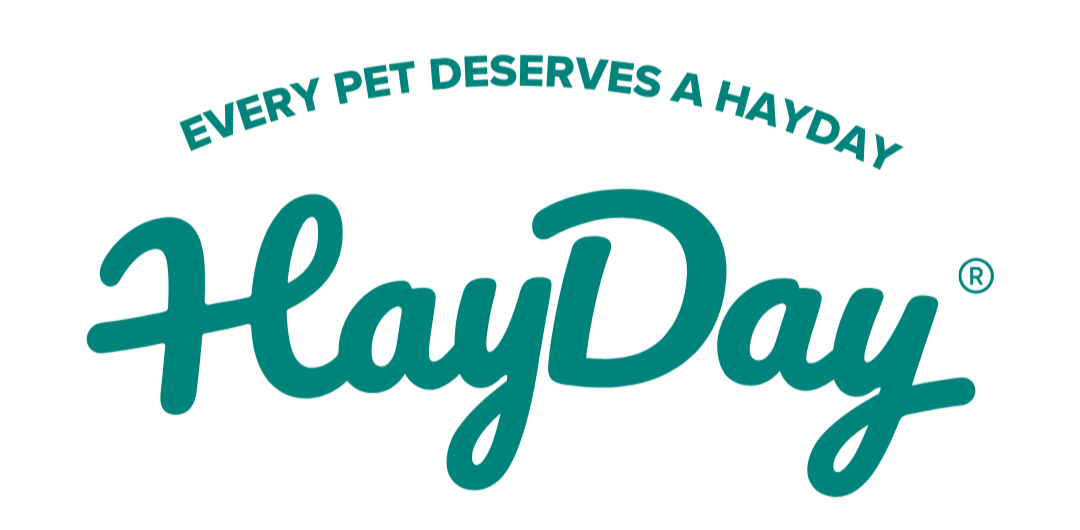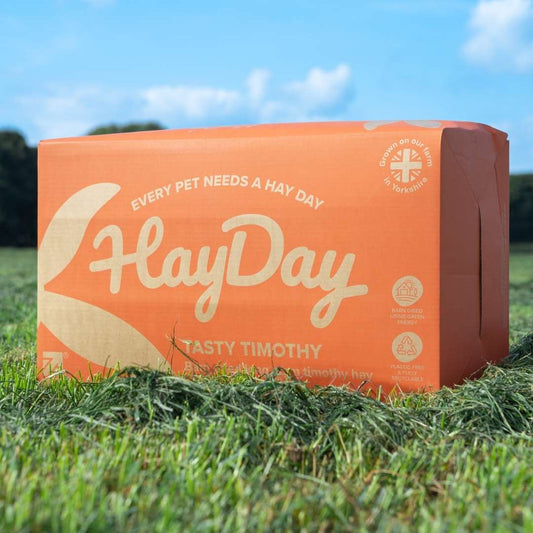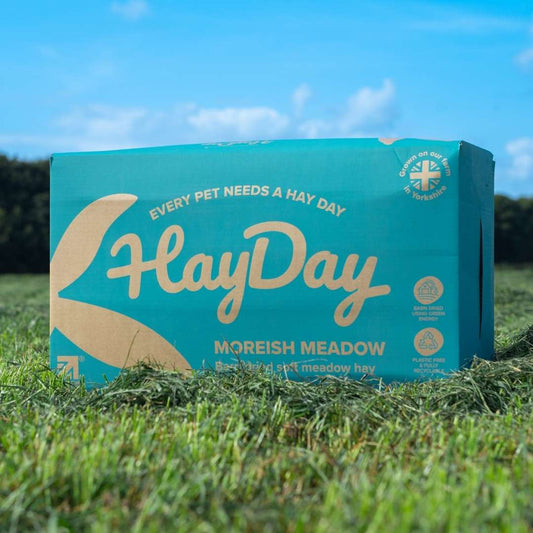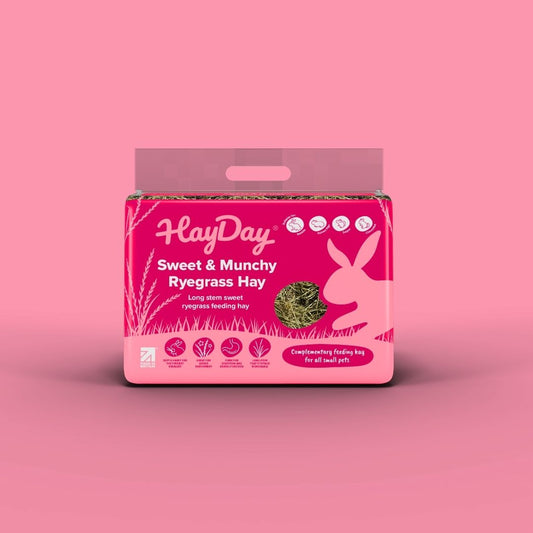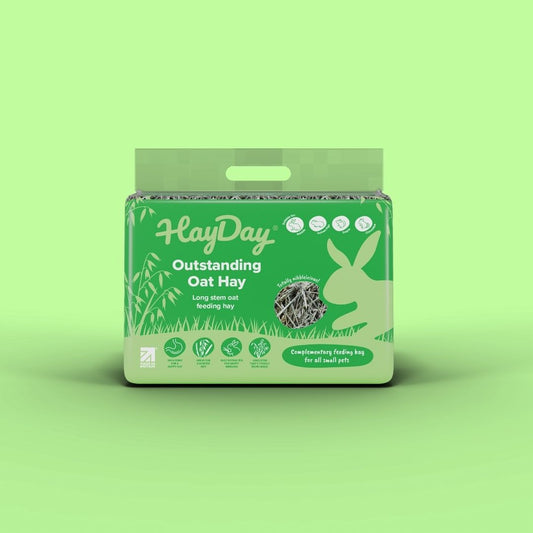As a rabbit owner, understanding which foods are dangerous for your bunny is crucial for their wellbeing.
This guide from the hay experts at HayDay dives into unsafe food for rabbits, detailing the common household items and often misunderstood foods that pose risks to your pet.
From specific vegetables and fruits to misleadingly marketed treats, we’ll cover the essentials to help you steer clear of any potential dietary hazards.
Shop now > High quality, barn dried hay boxes for your rabbits.
What Not to Feed Rabbits - Overview
-
Several vegetables and greens like iceberg lettuce, potatoes, onions, and cauliflower can be dangerous to a rabbit’s health due to harmful compounds or digestive issues they may cause.
-
Certain fruits and seeds such as apple seeds, pear seeds, and stone fruit pits contain cyanide and are toxic to rabbits (Talcott and Person, 2012), while processed human foods and store-bought rabbit treats can contribute to obesity and digestive problems due to high sugar and unhealthy ingredients.
-
A balanced rabbit diet should primarily consist of high-quality hay, a limited amount (approximately an egg-cup full) of healthy pellets, a handful of safe leafy greens.
Harmful Vegetables and Greens For Rabbits
We often associate leafy greens with health and vitality, which most of them are! It’s tempting to think that everything that's good for us will be good for our rabbits. However, there are several vegetables and greens that rabbit's can't eat, so watch out when you're experimenting with leafy greens! Those harmful include:
-
Iceberg lettuce
-
Potatoes
-
Onions
-
Garlic
-
Leeks
-
Cauliflower
Let’s examine these veggies in more detail...
Iceberg Lettuce
It’s easy to assume that all leafy greens are safe for rabbits. After all, don’t rabbits love munching on fresh greens?
However, there are also some greens that are not suitable for rabbits, such as iceberg lettuce, due to a chemical it contains called lactucarium (Lowe, 2010).
Lactucarium can have negative effects on your rabbit’s health, causing lethargy and a euphoric high, similar to the effects of opium. Moreover, iceberg lettuce offers little to no nutrition, making it an unsuitable food choice for your rabbit.
Potatoes and Onions
We might love potatoes and onions in our meals, but for our rabbits, these are a big no-no. These foods are high in carbohydrates and starch, which can lead to digestive issues in our bunnies (Lowe, 2010).
Solanine, a toxic alkaloid found in raw potatoes, can lead to decreased appetite, digestive upset, and abdominal pain in rabbits (Lowe, 2010). It is important to make sure that rabbits do not have access to raw potatoes. Therefore, it’s wise to keep these foods off of your rabbit’s plate.
Cauliflower
Cauliflower is also unsuitable for rabbits. While it might be a staple in our diets, cauliflower can cause gas and bloating in rabbits, making them uncomfortable and potentially causing harm.
Given the risks, it is best to exclude cauliflower from your rabbit’s diet. Better safe than sorry, right?
What Foods Are Poisonous to Rabbits?
While fruits can be a healthy snack for us, certain fruits, seeds, and pits pose a considerable risk to our rabbit companions. Some fruits contain cyanide, a substance that’s poisonous to rabbits and can be deadly (Talcott and Person, 2012).
It’s important to remember that although fruits can be a sweet treat for our rabbits, they should be given sparingly, and some should be avoided altogether. Let’s explore this further.
Fruit Seeds and Pits
While we might enjoy munching on apples and pears, we need to be careful when offering these fruits to our rabbits. The seeds and pits of these fruits, as well as those of apricots, peaches, plums, mangos, and cherries, contain cyanide, which is toxic to rabbits (Talcott and Person, 2012).
It is crucial to remove the parts which contains cyanide before feeding these fruits to your bunny.
Processed Foods and Store-Bought Treats
As we navigate the grocery aisles, we might be tempted to pick out treats for our furry friends. However, many processed human foods and store-bought rabbit treats can be harmful for our rabbits due to their high sugar content and unhealthy ingredients.
While the packaging might claim these treats are suitable for rabbits, that’s not always the case. From cereals to baked treats, let’s delve into the specifics of why these foods should be avoided.
Cereal, Crackers, and Bread
We might enjoy a bowl of cereal or a cracker as a quick snack, but for our rabbits, these foods can lead to various health problems. Processed foods do not match the natural dietary needs of rabbits, causing both digestive issues and contributing to obesity.
Even healthier human foods like oatmeal offer no nutritional advancement for rabbits and should not be included in their diet. Instead, rabbits need a diet consisting of high-quality hay, rabbit friendly pellets and a handful fresh vegetables daily.
Store-Bought Rabbit Treats
Store-bought rabbit treats might seem like a convenient choice, but many of them contain high sugar content and unhealthy ingredients that can lead to gastrointestinal issues and tooth decay, especially for those with a sweet tooth. Some common unhealthy ingredients to watch out for in rabbit treats include:
-
High sugar content
-
Artificial colours and flavours
-
Nuts and seeds
-
Excessive fat content
These ingredients can negatively impact a bunny’s health. It’s best to opt for healthier alternatives or make your own homemade treats using rabbit-safe ingredients.
Dangerous Nuts and Seeds
We’ve all seen the caricature of a rabbit munching on a carrot, but what about a rabbit nibbling on a walnut or a sunflower seed? As it turns out, most nuts and seeds are high in fat and can be unhealthy for rabbit digestion, necessitating a diet high in fibre instead.
Even though they’re small, seeds and nuts can cause serious problems for rabbits. Let’s delve into why that is.
Walnuts and Peanuts
Walnuts and peanuts, while tasty for us, are harmful for our rabbits primarily due to their high fat content. Consuming these nuts can lead to uncomfortable indigestion for rabbits because they contain more fat than fibre.
As rabbit owners, it’s paramount to avoid feeding walnuts and peanuts to our furry friends. The risks far outweigh any perceived benefits.
Unsafe Seeds
Many seeds, while not inherently toxic, are high in fat and their nutritional value may not be ideal for rabbits. If consumed in significant quantities, they could contribute to obesity in rabbits. Cherry pits, for instance, are particularly dangerous and must be avoided to prevent toxicity.
Poisonous Plants and Houseplants
Our homes are often adorned with beautiful plants that not only enhance the aesthetics but also bring a touch of nature indoors. However, all houseplants, as well as garden plants, should be considered potentially toxic to rabbits, including ivy, philodendron, and most evergreen trees (Rabbit Welfare, 2024).
Ingesting certain plants like lilies, rhododendrons, and elder can cause serious health issues, including heart problems, gastrointestinal issues, and salivation in rabbits (Talcott and Person, 2012). It’s essential to keep potentially harmful houseplants out of reach and ensure outdoor plants like ragwort are not easily accessible to our furry friends.
Tips for a Balanced Rabbit Diet
After uncovering the harmful foods, it’s time to focus on what makes up a balanced diet for our rabbits. A balanced rabbit diet should include:
-
High-quality grass hay: including Timothy Hay, Meadow Hay, Ryegrass Hay and Alfalfa Hay (the latter two should be fed additionally to other hay types to add enrichment)
-
A limited amount (approximately an egg-cup full) of healthy pellets
-
A handful of a variety of safe leafy greens
-
Occasional treats (such as fruit or hay cookies) in moderation
By providing a balanced diet, we can ensure our rabbits live a long and healthy life, free from the risks associated with an improper diet. Let’s break down the components of a healthy diet for a balanced rabbit lifestyle.
High Quality Hay and Pellets
High-quality grass hay, such as timothy hay, meadow hay, ryegrass hay or alfalfa hay, should be available to rabbits at all times and constitute the bulk of their diet. Hay is essential for a rabbit’s diet as it aids in dental, digestive and gut health.
Pellets should also constitute approximately 5-10% of your small pet's diet. You can try scatter feeding your rabbit's pellets within their hay to encourage a greater hay intake.
Safe Leafy Greens
A crucial part of a rabbit’s diet, leafy greens should be included regularly. Safe options for fresh leafy greens include basil, romaine lettuce, carrot tops, and a variety of other greens.
Some safe leafy greens for rabbits include:
-
Romaine lettuce
-
Spinach
-
Kale
-
Swiss chard
-
Bok choy
-
Cilantro
-
Parsley
Miller, 2022; Rabbit Welfare, 2024
Providing a mix of these various greens can contribute to a rabbit’s balanced and nutritious diet.
Summary
Feeding our rabbits can be straightforward, if we understand the foundations of a healthy balanced diet and what forage and foods we can feed. Careful consideration is needed to ensure that the foods we offer are safe and beneficial for their health. From avoiding harmful vegetables, fruits, and processed foods to understanding the dangers of certain nuts, seeds, and houseplants, we’re now equipped with the knowledge to protect our bunny’s health.
Let’s remember to provide a balanced diet of high-quality hay, safe leafy greens and pellets. With these tips, we can ensure our furry friends live a long, healthy, and happy life.
Frequently Asked Questions
Why can't rabbits eat iceberg lettuce?
Rabbits can't eat iceberg lettuce as it contains lactucarium, which can be harmful when consumed in large quantities. Darker lettuce leaves are more nutritious and can be fed to rabbits more frequently. Iceberg lettuce also contains mostly water and lacks nutritional value.
Can a rabbit eat a banana?
Yes, rabbits can eat bananas in moderation as a treat due to their high sugar content. It's best to offer them a small slice occasionally to prevent any health risks.
Are potatoes and onions safe for rabbits?
Potatoes and onions are not safe for rabbits due to their high carbohydrate and starch content, which can lead to digestive problems.
Relevant Advice
References
Lowe, J.A. (2010) Pet Rabbit Feeding and Nutrition. In: deBlas, C and Wiseman, J (Eds.), Nutrition of the Rabbit. Oxford Cab International, 294-313.
Miller, C. (2022) Small mammal herbivores, part 2: nutrition for wellness. The Veterinary Nurse, 13 (8): 368- 376
Rabbit Welfare (2024) Poisonous Plants. [Online]
Rabbit Welfare (2024) Recommended vegetables and herbs.. [Online]
Talcott, P.A. and Peterson, M.E. (2012) Small Animal Toxicology. Elsevier Health Sciences: London
